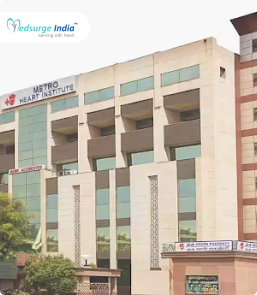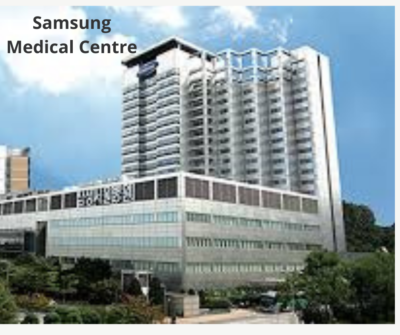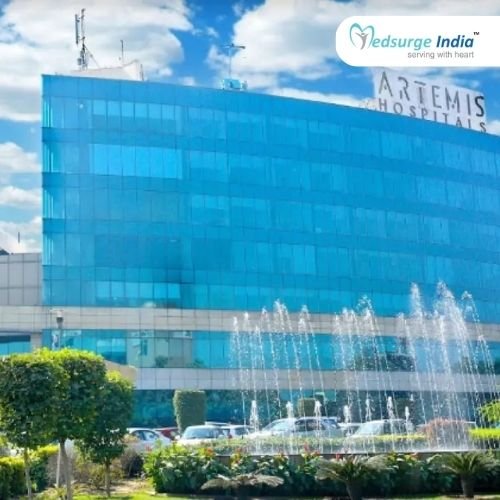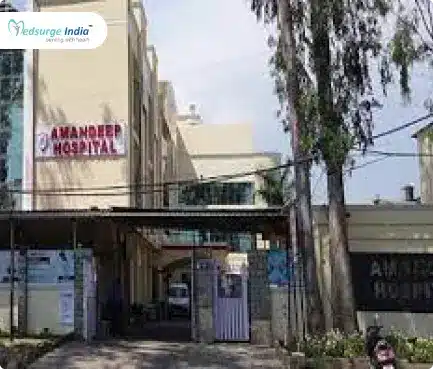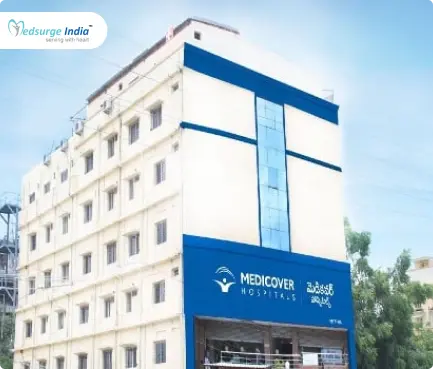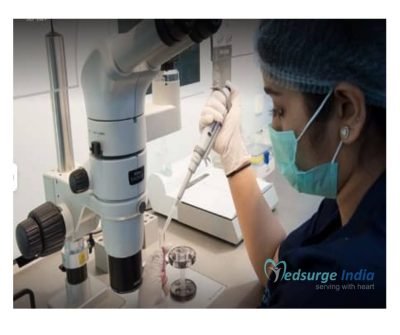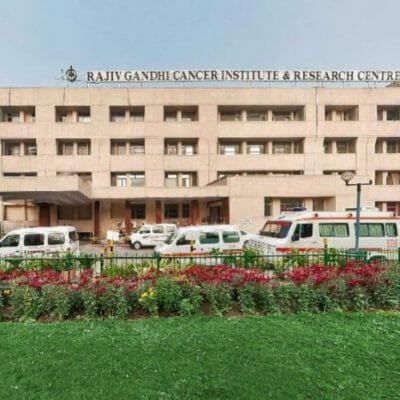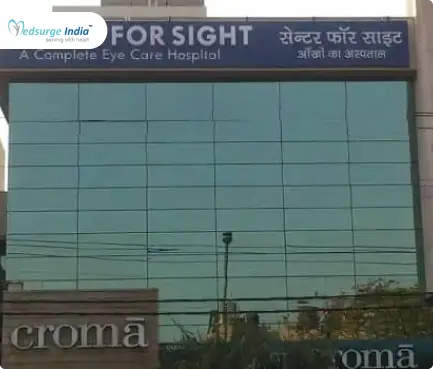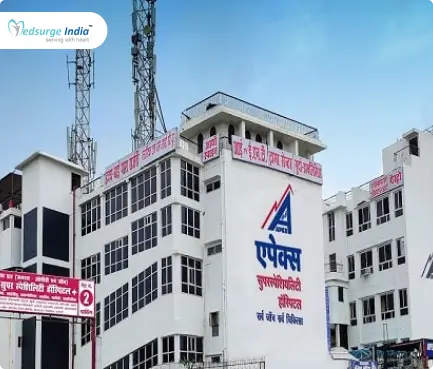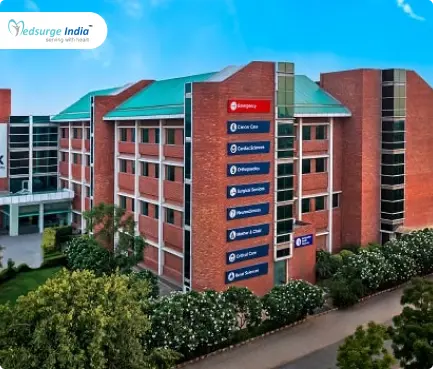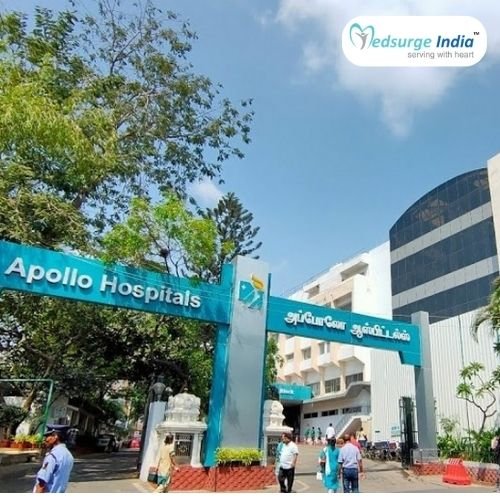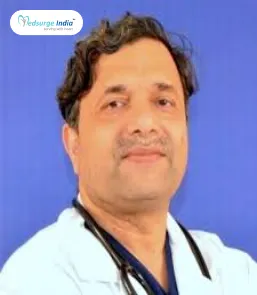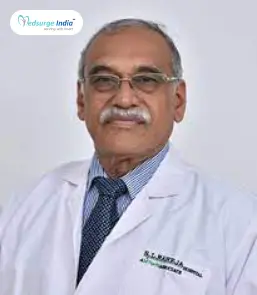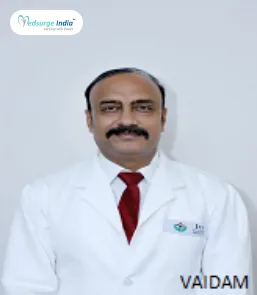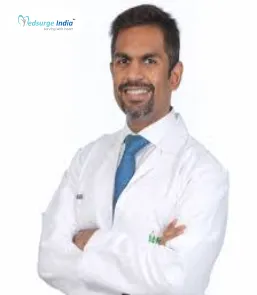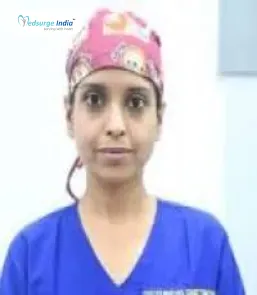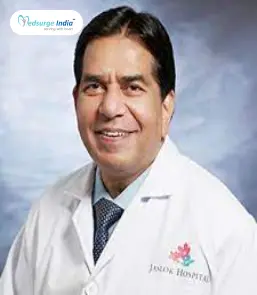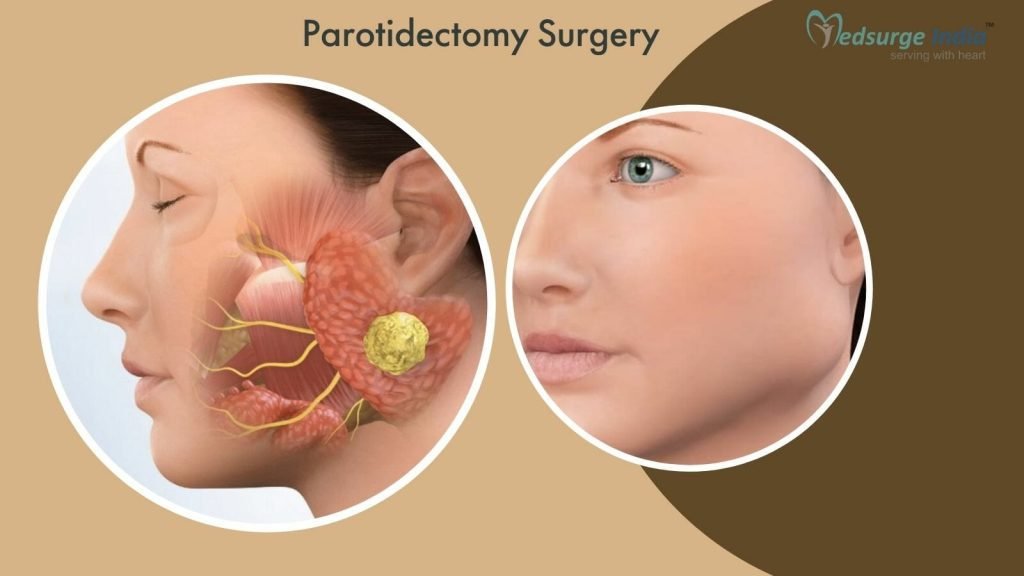
The largest salivary glands, the parotid glands, are surgically removed through a procedure known as parotidectomy surgery in India.
Neoplasms, which are dividing cells that are growing quickly and improperly, are removed with parotidectomy. There are two procedures to execute a parotidectomy. In order to do a superficial parotidectomy, the surgeon makes an incision in front of the ear that extends all the way down to the neck. Depending on the extent of the tumor, a total parotidectomy is performed to remove the entire parotid gland along with the facial nerve and tissues.
Parotidectomy surgery cost in India is quite affordable as compared to other developed countries. The patient has to spend two days in the hospital and seven days outside of it. The patient’s diagnosis and the facilities they choose will influence the overall cost of the treatment.
The survival rate of parotidectomy surgery in India depends on the patient’s age and the severity of the disease.
What Is Parotid Tumor?
The parotid glands can develop abnormal cell growths called tumors are known as parotid tumors. Two salivary glands called parotid glands are located on each side of the face, right in front of the ear. Saliva is produced by salivary glands to help with the chewing and digestion of foods.
The lips, cheeks, mouth, and throat all contain many salivary glands. All of these glands are capable of developing tumors, although parotid glands are the most frequently affected. Although some tumors can develop into cancer, the majority of parotid tumors are benign (noncancerous).
Usually, painless swelling in the face or jaw is a common symptom of parotid tumors. Numbness, burning or prickling sensations in the face, as well as a loss of facial movement, are some other symptoms.
Surgery to remove the tumor is typically used to treat parotid tumors. If cancer cells are present in the tumor, other additional therapies might be suggested.
What Is Parotidectomy?
Surgery to remove the parotid gland is known as a parotidectomy. Of all the salivary glands, the parotid gland is the biggest. It is located behind the ears. Saliva is produced and secreted by the parotid gland. Saliva is important for food digestion, bacterial removal from the mouth, and tooth decay prevention.
Salivary gland cancers often start in the parotid gland. They are rare and most parotid tumors are benign (not cancerous).
In some cases of salivary cancer, a parotidectomy may be performed. Treatment for non-cancerous conditions like chronic infections and salivary gland obstruction (blockage) may also involve this procedure.
What Are the Symptoms of a Parotid Tumor?
Some signs and symptoms of a parotid tumor are the following:
- Usually painless, firm swelling in a salivary gland (in front of the ears, under the chin, or on the floor of the mouth). Depending on the underlying reason, swelling might develop at different rates. Rapid swelling is more likely to be a sign of an infection or a malignant tumor, while slow swelling typically signals a benign tumor.
- Difficulty moving one side of the face is known as facial nerve palsy. This may be an indication of an advanced, malignant tumor, especially in the parotid gland.
Parotidectomy Surgery Cost in India
The average Parotidectomy Surgery Cost in India starts from USD 1,500. The cost of the treatment will vary according to the place and hospital you choose.
Types of Parotidectomy Surgery in India
| Treatment | Starting Price |
| Superficial Parotidectomy | USD 2,500 |
| Total Parotidectomy | USD 2,700 |
Here are the estimated prices depending on different cities in India
| Cities | Starting Price |
| Delhi | USD 1,500 |
| Gurgaon | USD 1,500 |
| Noida | USD 1,500 |
| Mumbai | USD 1,700 |
| Hyderabad | USD 1,500 |
| Chennai | USD 1,500 |
| Kolkata | USD 1,500 |
| Bangalore | USD 1,600 |
Please keep in mind that prices of Parotidectomy Surgery Cost in India will vary depending on various factors.
Factors That Can Affect Parotidectomy Surgery Cost in India
The standard and grade of medical care and amenities are comparable to those of the most prestigious healthcare facilities in the world, even when the expense of lodging, meals, and transportation is taken out. The following here are some variables that can affect Parotidectomy Surgery Cost in India:
- Medication costs.
- Duration of treatment.
- Geographical location.
- Hospitalization expenses.
- Government policies and subsidies.
- Medical tourism packages.
- Hospital reputation and infrastructure.
- The expertise and experience of medical professionals.
- The type and frequency of diagnostic procedures.
- The choice of treatment modality.
Under the direction of the most skilled physicians, Medsurge India provides patients with the lowest Parotidectomy Surgery Cost in India.
How the Diagnosis of Parotid Tumor is Done?
A larger-than-normal salivary gland, typically one of the parotid glands, may be found during a physical examination by a doctor or dentist, suggesting that you may have a tumor.
When seeking a diagnosis for salivary gland swelling, many patients frequently worry that it is cancer. Testing might involve:
- X-rays of the salivary gland to check for tumors are known as a sialogram.
- To confirm the presence of a tumor and determine whether it has spread to the neck lymph nodes, use an ultrasound, CT scan, or MRI.
- Using a fine needle aspiration or salivary gland biopsy, the type of tumor can be identified as benign or malignant.
- A minimally invasive outpatient treatment called sialendoscopy is used to find tiny tumors that could otherwise go undetected and develop into a later-stage malignancy.
Helpful – Head and Neck Cancer – Types, Causes and Diagnosis
Get Free Cost Estimation
Procedure
How Parotidectomy Surgery is Done?
Surgery is typically the first line of treatment for all parotid tumors, both benign and malignant. Paralysis of the facial nerve is the biggest threat associated with the procedure known as a parotidectomy. To preserve function and prevent unintended complications, the treating surgeon must use the utmost care and dexterity due to the variety of delicate structures that lie over, surround, and course through the parotid gland. For instance, the parotid gland and facial nerve are closely connected. The facial nerve is partly responsible for taste perception and controls the muscles that move the face.
There are two types of parotidectomy:
Superficial parotidectomy: It involves removing the parotid gland’s superficial (outside) portion surgically. The doctor makes an incision down the neck and in front of the ear. Because it tries to avoid the facial nerve, this rarely affects how the face moves.
Total Parotidectomy: Complete removal of the parotid gland occurs in this procedure. The doctor makes a cut along the neck and in front of the ear. Depending on the location of the tumor, additional tissues may also need to be removed, including the facial nerve. Your ability to move your face may be impacted by this method.
Neck lymph nodes may need to be removed in specific circumstances. It’s known as a lymphadenectomy. It can be necessary to remove blood vessels, muscles, connective tissue, and the neck. To do this, a long incision (cut) is made in the neck.
Each situation is unique, so your doctor will discuss the specific details of your surgery with you.
The cost of hospitalization, a surgeon’s fee, prescription expenditures, etc. are all included in the treatment plan. The price may, however, go above this range if the patient experiences severe postoperative complications or if they require a lot of additional care to make up for their pre-existing health problems.
What Are the Risks of having Parotidectomy Surgery?
There are risks and potential side effects with any procedure. These include:
- Reaction to anesthesia. Reactions can include wheezing, rash, swelling, and low blood pressure).
- Bleeding.
- Clots of blood.
- Infection.
- Injury to facial nerves. This can result in arm weakness, weakness in the lower lip, loss of facial muscles, face drooping, trouble moving the tongue, and difficulties speaking or swallowing.
- Frey syndrome (Damage to the facial nerves that results in a disease. When eating, or even just thinking, dreaming, or talking about eating, it induces facial flushing and perspiration.)
- Loss of ear sensation.
- A dry eye
- Fistula in the saliva (An abnormal opening in the skin that saliva may leak through).
- Modification in your physical appearance.
- Your surgeon will go over any additional risks with you prior to the procedure based on your health and the particular surgery you are undergoing.
Suggestion
In addition to the standard elements of a thorough physical examination, a thorough evaluation of a parotid tumor should take into account the following essential aspects:
- History of the particular salivary gland
- Ductal system assessment
- Biopsy of the salivary gland
- MRI scans
- Customizable alternatives for therapy
Also points to remember, until you feel better, you might require a family member or friend to assist you with your everyday activities. Before your team allows you to resume your regular activity, it can take some time.
To avoid discomfort, infection, and/or constipation, make sure to take your medications as prescribed. If you notice any new or worsening symptoms, call your team.
After surgery, constipation can be treated in a number of ways. You can alter your eating habits, increase your fluid intake, and use over-the-counter drugs. Before taking any drugs to treat constipation, consult your healthcare provider.
Know More –
Best Hospitals in India
The Most Important Frequently Asked Questions
Q: Are Parotid Tumors Fatal?
A: The 5-year survival rate is 67% if cancer has progressed from the salivary gland to surrounding tissues or lymph nodes. The 5-year survival rate is 44% if it is discovered after cancer has progressed to distant areas of the body.
Q: Is the Parotid Gland Necessary for Survival?
A: The amount of saliva you produce will not change if one of your parotid glands is removed. The mouth’s remaining many salivary glands will continue to keep it moist.
Q: Is Parotidectomy a Major Surgery?
A: The largest and most important of the salivary glands, the parotid, is surgically excised (removed). The treatment is most frequently carried out because of neoplasms (tumours), which are growths of cells that divide improperly and quickly.
Q: How Long Is Recovery from Parotid Surgery?
A: The fluid beneath the surface of the skin is being absorbed, which may cause a slight yellowing of the skin. In the ensuing two weeks, the skin tone will revert to normal. After surgery, you can go back to work anywhere between 10 and 14 days. In 3–4 weeks, you could start exercising again.
Q: Can a Parotid Tumor Grow Back?
A: Parotid tumors can recur as a single solitary mass or the recurrence may present as a large cluster of separate tumors.
Top Hospitals for Parotidectomy Surgery in India
Top Doctors for General Surgery
Dr. Yashavanth Kumar V
Consultant
Experience: 10 years of experience
Fortis Hospital, Bangalore (Bannerghatta Road)
Bangalore, India
Dr. Umesh Takalkar
Director
Experience: 31 years of experience
United CIIGMA Hospital, Aurangabad, Maharashtra, India
Aurangabad, India
Dr. Mohan Koppikar
Senior Consultant
Experience: 26 years of experience
Fortis Hospital, Mulund, Mumbai
Mumbai, India
Dr. Surinder Chugh
Consultant
Experience: 20 years of experience
Batra Hospital & Medical Research Centre, New Delhi
New Delhi, India
Dr. Praveen Kumar
Experience: 16+ years of experience
NH Rabindranath Tagore International Institute of Cardiac Sciences, Kolkata
Kolkata, India
Dr. Nanda Rajaneesh
Consultant
Experience: 22 years of experience
Apollo Spectra Hospital, Bangalore
Bangalore, India
Dr. Shakir Tabrez
Consultant
Experience: 16 years of experience
Fortis Hospital, Bangalore (Bannerghatta Road)
Bangalore, India
Dr. Shreya Bhattacharya
Senior Consultant
Experience: 16+ years of experience
Narayana Multispeciality Hospital, Andul Road, Howrah
Howrah, India
Dr. Prakash A.S
Senior Consultant
Experience: 31 years of experience
Apollo Spectra Hospital, Bangalore
Bangalore, India
Dr. Shashank Shukla
Senior Consultant
Experience: 15+ years of experience
Narayana Multispeciality Hospital, Andul Road, Howrah
Howrah, India
Dr. Moksha Gowda
Consultant
Experience: 14 years of experience
Fortis Hospital, Bangalore (Bannerghatta Road)
Bangalore, India

